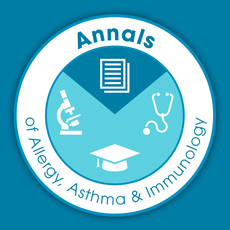 June is finally here and school is out. The long, hot summer (at least for most of us in the U.S.) has begun. Hopefully you will have some quality downtime with friends and family soon. There will be picnics, parties and cookouts. No doubt many of you will see patients with food reactions for which you will do workups. The June emphasis of the Annals is food allergy and we have several offerings that I believe will be interesting, informative and useful in your practice.
June is finally here and school is out. The long, hot summer (at least for most of us in the U.S.) has begun. Hopefully you will have some quality downtime with friends and family soon. There will be picnics, parties and cookouts. No doubt many of you will see patients with food reactions for which you will do workups. The June emphasis of the Annals is food allergy and we have several offerings that I believe will be interesting, informative and useful in your practice.
First is a review article by Mirna Chehade, MD, MPH and colleagues from Mt Sinai who review signs and symptoms of feeding difficulties in children with non-IgE-mediated food allergic gastrointestinal disorders and provide practical advice, with the goal of guiding the clinician to timely referral for further evaluation and therapy. Various management approaches are also discussed. They conclude by emphasizing the multidisciplinary approach to care of these children to provide optimal, effective therapies.
Another food-related article is this month’s CME review written by Sam Mehr, MBBS, BMedSci from Australia and Terri Brown-Whitehorn, MD discussing the presentations of non-IgE-mediated food sensitivities that primarily involve the gut. These include food protein induced allergic proctocolitis seen as bloody diarrhea in otherwise healthy infants, food protein enteropathy and food protein-induced enterocolitis syndrome which can be differentiated clinically with various approaches to management. Eosinophilic esophagitis is also discussed and its chronicity well described. This article is a must read for those who care for infants and children with food-associated prominent gastrointestinal symptoms.
As always, we hope you enjoy reading this month’s issue of the Annals and welcome your comments and suggestions.
Gailen D. Marshall, Jr., MD, PhD, FACAAI
Editor-in-chief

